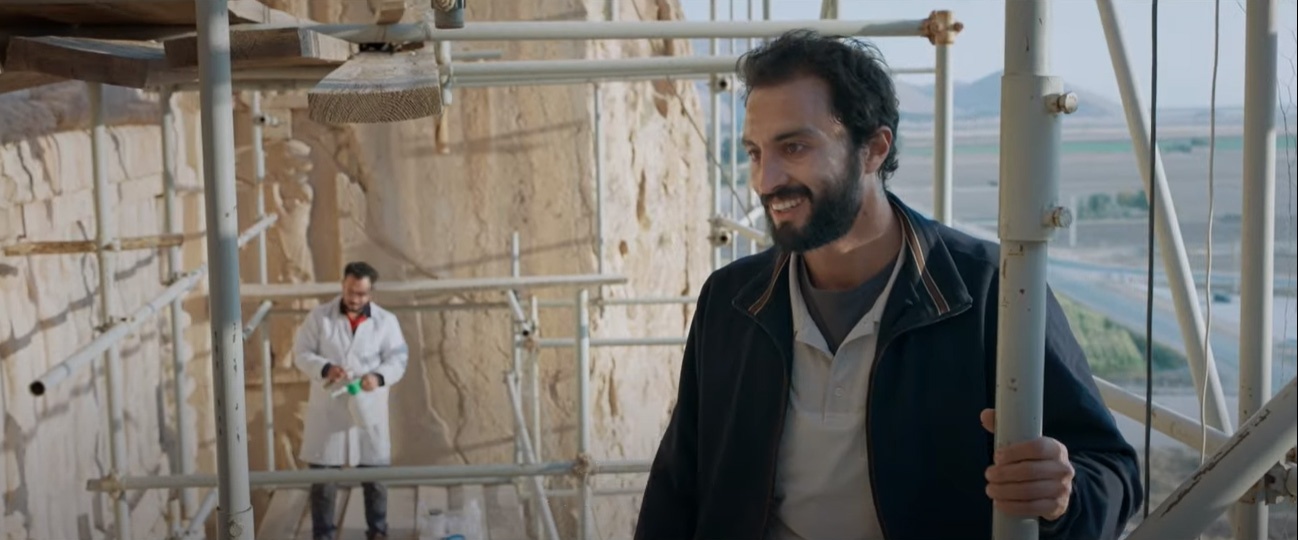Very few moviemakers out there have a way of making their films feel like parables or fables that should be told, generation to generation. One of those filmmakers is Asghar Farhadi, who exploded onto the scene with the best movie about divorce ever made, A Separation. Even in his other films (The Past, The Salesman), Farhadi’s screenplays dig into some ubiquitous societal dilemma that has to be overcome, usually while dealing with the consequences of the dilemma in question. A Hero, Farhadi’s best since A Separation, plunges deep into the dilemma of what being a hero actually means, and more importantly, the consequences of carrying that title, “Hero.”
The “hero” in Farhadi’s movie is Rahim (Amir Jadidi). On a 2 day furlough from prison, Rahim’s love Farkhondeh (Sahar Goldoost, but NOT his wife, important) found a purse with some gold coins. The pair hope these coins are enough to convince Rahim’s creditor Bahram (Mohsen Tanabandeh), who put him in prison, to annul Rahim’s debt, so he can be free. But when Rahim finds out that the gold isn’t enough, he heroically helps find the purse’s owner, which makes him a local celebrity.
The reason Farhadi’s screenplays are so potent is because they operate like Russian nesting dolls. The movie’s setup makes you think the story is going to be about Rahim’s frantic quest to get out of prison in 2 days, a brother to a movie like 25th Hour. Nope, Farhadi finds a simple resolution to that story quickly, but that resolution starts another story about social media, news, and celebrity culture. That celebrity story then brings back in unresolved parts of Rahim’s larger story. That in turn leads to a mystery subplot, which leads to a study about social media culture, and so forth and so forth. What I love about A Hero, and Farhadi’s stories in general, is that he grounds them in reality, and lets them reach expected natural conclusions. Those conclusions produce intended and unintended consequences, which naturally leads into the next part of the story to deal with. Farhadi’s A Hero doesn’t subscribe to modern Hollywood’s screenplay techniques of jumping from plot point to plot point: instead, it lives in its decisions and consequences, which makes for a much more potent and emotional mixture than just some flashy storytelling, and gets you invested in the characters and their plights.
And the plights in this one are issues that any person might encounter in their lifetime: becoming an overnight celebrity. Most people when they become famous, cannot possibly predict all the consequences of that jump in status. They know about the fame and boost in their reputation (very important to Rahim, and in Iran), but they don’t know that “their” story quickly be taken from them. Celebrity status gives you power, and what is attracted to power? Powerful people, forces, and institutions. The Prison warden hears Rahim’s tale, and sees a chance to showcase some positive results of his prison policies. And also, maybe to shed some bad publicity due to a prison suicide, at the same time. As you can see, Rahim’s story is now enmeshed with the prison’s, and because they hold all the cards, they tweak the actual version of events, to help make the story even more popular. Then the media gets the story, and Rahim’s lost full control over his own reputation and story. It spreads so far and wide, it bumps into Bahram and his money, threatening the reputation of Rahim’s creditor. But Bahram not only has more power than Rahim, he has all of the facts of the story, and he starts to poke holes in the current version of Rahim’s story, which Rahim knows are correct, but he can’t do anything about it. This leaves Rahim back at square one, desperate to recoup his reputation, but now he has to do so with more people than just Bahram, so he has to resort to all sorts of more desperate methods he’s incapable of fathoming consequences for, alienating him from people who care about him. Farhadi simplifies the story to amplify its message, which he drives home by also showing all the consequences of shortsighted narcissistic decision making to boost a person’s reputation.
To be A Hero carries a mantle Asghar Farhadi wants everyone to understand carries with it a lot of personal responsibility. You can have people call you a hero all you want, but if you don’t live life like a hero is supposed to, people with turn against you pretty quickly, or take the mantle away from you for their own. I look forward to the generations of film students who grew up with films over books, and get a chance to watch Asghar Farhadi’s movies like this one, because lessons and fables like this can only be delivered by gifted storytellers like him. I’m certainly scared straight about posting stories to Instagram making me look awesome.

